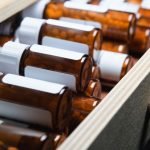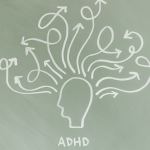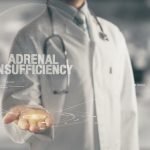Antioxidants & Male Infertility: Can Supplements Make a Difference?
Tolle Causam
Chris D. Meletis, ND
Modern couples are attempting to procreate in a world of toxins and dietary and lifestyle habits that produce an overabundance of reactive oxygen species (ROS); antioxidant defenses are burdened as a result. Toxins (eg, bisphenol-A and pesticides in food), aging, psychological stress, obesity, poor nutrition, reduced physical activity, high intake of caffeine, high scrotal temperature, and mobile telephone use all cause an uncontrolled release of ROS, and all have been implicated in the etiology of infertility.1-3 With increased exposure to all of these factors, it is therefore not surprising that, globally, 15% of modern couples (48.5 million) are infertile.4
A couple is considered infertile if they are unable to conceive after at least a year of regular, unprotected intercourse. Male infertility is thought to be responsible for 50% of overall cases.4 Although the cause of some cases of male infertility has been identified, such as varicocele, cryptorchidism, and hypogonadism, many cases of infertility remain idiopathic. In more than 25% of cases, no explanation can be found for an abnormal semen analysis.5
ROS: A Driving Force
Molecular-level research directed at identifying the causes of idiopathic male infertility has deemed oxidative stress to be an important contributor.6 ROS have been found to be higher in subfertile men,5 and are elevated in up to 40% of infertile men.7 These high levels were not observed in fertile men.7 Balanced levels of ROS are required for some sperm functions, including fertilization of the egg.8 However, uncontrolled generation of ROS harms sperm function,9 leading to DNA damage,10 impaired motility,11 and defective membrane integrity.12 Spermatozoa are especially vulnerable to oxidative damage on account of the presence of large quantities of plasma membrane polyunsaturated fatty acids.5 Modern males are subjected to an onslaught of oxidative stress, which may be a primary reason why sperm counts in men have progressively declined since the 1930s.13 Specifically, in the 1930s, only 15% of men had a sperm count <40 million/mL, whereas by the 1990s to 2000, that percentage increased to 40%.13 Average sperm count normally ranges from 45 to 65 million/mL.14 However, a series of European studies of men between 18 and 25 years old from 7 countries found that, depending on the country, approximately 20% of young men had a sperm count <20 million/mL and approximately 40% had a sperm count <40 million/mL. This latter level is thought to be the threshold below which fertility diminishes.14
One mechanism by which oxidative stress leads to infertility may involve sperm DNA fragmentation, which is a strong indicator of the ability to conceive – even more so than conventional semen markers.15 Men who have high DNA fragmentation levels are significantly less likely to conceive, either naturally or through intrauterine insemination or in-vitro fertilization (IVF).15 Oxidative stress is the primary reason why DNA fragmentation occurs in spermatozoa.15 Reducing oxidative stress may therefore reduce DNA fragmentation, increasing the likelihood of conception.15
Antioxidants & Fertility
Evidence indicates that antioxidant supplementation can play a valuable role in mitigating various aspects of oxidative damage in human sperm. In a prospective clinical trial, Arafa and colleagues studied 101 infertile men who had an abnormal semen analysis.16 The men were given an antioxidant supplement containing L-carnitine, coenzyme Q10 (CoQ10), lycopene, N-acetyl L-cysteine, vitamins E, A, D3, C, K, and B-complex, iodine, selenium, zinc, copper, manganese, chromium, molybdenum, grape seed extract, benfotiamine, and L-arginine 3 times per day. At the end of the 3-month study, sperm count increased by 33%, progressive motility increased by 122%, and normal morphology increased by 62%. Furthermore, DNA fragmentation decreased by 20%, and oxidation-reduction potential decreased by 44%.16
A collection of other research over the years has added to the body of evidence that antioxidant supplementation can improve sperm health. Abad and associates found that a combination of L-carnitine, CoQ10, zinc, selenium, and vitamins E, B9, and B12, administered for 3 months to 20 infertile patients diagnosed with asthenoteratozoospermia (reduced sperm motility), led to significantly improved DNA integrity.17 Furthermore, the proportion of highly DNA degraded sperm was lower after the antioxidant supplementation.17 Semen analysis revealed a pronounced increase in sperm concentration, motility, vitality, and morphology.17 One review of the medical literature showed 20 out of 32 studies observing significantly improved sperm motility after antioxidant use.5 Other studies have demonstrated that CoQ10 alone,18 N-acetylcysteine with selenium,19 or selenium with vitamin E20 significantly improved various sperm parameters, including morphology, motility, and density. Some of these nutrients, such as CoQ10, have also been found to improve pregnancy rate.21
In a 3-month study, L-carnitine plus acetyl-L-carnitine were administered twice daily, along with the anti-inflammatory drug cinnoxicam every 4 days, to 33 infertile men.22 The men and their partners were using intracytoplasmic sperm injection (ICSI) as a fertility treatment due to severe idiopathic oligoasthenoteratospermia. Of the 33 men, 22 had a reduced frequency of aneuploid sperm (spermatozoa with chromosomal abnormalities) and improved sperm morphology after supplementation combined with the drug. Use of L-carnitine, acetyl-L-carnitine, and cinnoxicam was also significantly associated with increased numbers of biochemical pregnancies, clinical pregnancies, and live births.22
The beneficial effects of antioxidants are due to their ability to directly scavenge ROS. For example, vitamin C, the principal antioxidant in seminal plasma, inhibits the formation of ROS from a number of sources and also helps recycle oxidized vitamin E.3 In sperm plasma membranes, vitamin E is also known to directly neutralize ROS.3
Conclusion
An abundant amount of research ties an overproduction of ROS to male infertility. Resolving the oxidative stress that ensues after ROS overproduction through the use of antioxidant supplements can improve many aspects of sperm health, including motility and morphology, and may even increase the rate of pregnancy and live births. In couples ultimately able to conceive, reducing oxidative stress can also improve cellular integrity of the next generation from conception onwards into childhood and beyond.
References:
- Machtinger R, Combelles CM, Missmer SA, et al. Bisphenol-A and human oocyte maturation in vitro.Hum Reprod. 2013;28(10):2735-2745.
- Ilacqua A, Izzo G, Emerenziani GP, et al. Lifestyle and fertility: the influence of stress and quality of life on male fertility. Reprod Biol Endocrinol. 2018;16(1):115.
- Nassan FL, Chavarro JE, Tanrikut C. Diet and men’s fertility: does diet affect sperm quality? Fertil Steril. 2018;110(4):570-577.
- Agarwal A, Mulgund A, Hamada A, Chyatte MR. A unique view on male infertility around the globe. Reprod Biol Endocrinol. 2015;13:37.
- Imamovic Kumalic S, Pinter B. Review of clinical trials on effects of oral antioxidants on basic semen and other parameters in idiopathic oligoasthenoteratozoospermia. Biomed Res Int. 2014;2014:426951.
- Majzoub A, Agarwal A. Systematic review of antioxidant types and doses in male infertility: Benefits on semen parameters, advanced sperm function, assisted reproduction and live-birth rate. Arab J Urol. 2018;16(1):113-124.
- Zini A, de Lamirande E, Gagnon C. Reactive oxygen species in semen of infertile patients: levels of superoxide dismutase- and catalase-like activities in seminal plasma and spermatozoa. Int J Androl. 1993;16(3):183-188.
- Griveau JF, Le Lannou D. Reactive oxygen species and human spermatozoa: physiology and pathology. Int J Androl.1997;20(2):61-69.
- Rivlin J, Mendel J, Rubinstein S, et al. Role of hydrogen peroxide in sperm capacitation and acrosome reaction. Biol Reprod. 2004;70(2):518-522.
- Lopes S, Jurisicova A, Sun JG, Casper RF. Reactive oxygen species: potential cause for DNA fragmentation in human spermatozoa. Hum Reprod. 1998;13(4):896-900.
- Kao SH, Chao HT, Chen HW, et al. Increase of oxidative stress in human sperm with lower motility. Fertil Steril. 2008;89(5):1183-1190.
- Aitken RJ, Clarkson JS, Fishel S. Generation of reactive oxygen species, lipid peroxidation, and human sperm function. Biol Reprod. 1989;41(1):183-197.
- Sharpe RM. Sperm counts and fertility in men: a rocky road ahead. EMBO Rep. 2012;13(5):398-403.
- Jørgensen N, Asklund C, Carlsen E, Skakkebaek NE. Coordinated European investigations of semen quality: results from studies of Scandinavian young men is a matter of concern. Int J Androl. 2006;29(1):54-61; discussion 105-108.
- Wright C, Milne S, Leeson H. Sperm DNA damage caused by oxidative stress: modifiable clinical, lifestyle and nutritional factors in male infertility. Reprod Biomed Online. 2014;28(6):684-703.
- Arafa M, Majzoub A, Agarwal A, et al. Is there a role for oral antioxidants in the treatment of infertile men with high sperm DNA fragmentation? Presented at the Foundation of Reproductive Medicine annual conference, New York, November 2018. Available at: http://cme-utilities.com/mailshotcme/FRM/2018/Abstracts/51.pdf. Accessed January 6, 2019.
- Abad C, Amengual MJ, Gosálvez J, et al. Effects of oral antioxidant treatment upon the dynamics of human sperm DNA fragmentation and subpopulations of sperm with highly degraded DNA. Andrologia. 2013;45(3):211-216.
- Safarinejad MR, Safarinejad S, Shafiei N, Safarinejad S. Effects of the reduced form of coenzyme Q10 (ubiquinol) on semen parameters in men with idiopathic infertility: a double-blind, placebo-controlled, randomized study. J Urol. 2012;188(2):526-531.
- Safarinejad MR, Safarinejad S. Efficacy of selenium and/or N-acetyl-cysteine for improving semen parameters in infertile men: a double-blind, placebo-controlled, randomized study. J Urol. 2009;181(2):741-751.
- Moslemi MK, Tavanbakhsh S. Selenium-vitamin E supplementation in infertile men: effects on semen parameters and pregnancy rate. Int J Gen Med. 2011;4:99-104.
- Safarinejad MR. The effect of coenzyme Q₁₀ supplementation on partner pregnancy rate in infertile men with idiopathic oligoasthenoteratozoospermia: an open-label prospective study. Int Urol Nephrol. 2012;44(3):689-700.
- Cavallini G, Magli MC, Crippa A, et al. Reduction in sperm aneuploidy levels in severe oligoasthenoteratospermic patients after medical therapy: a preliminary report. Asian J Androl. 2012;14(4):591-598.
 Chris D. Meletis, ND, is an educator, international author, and lecturer. He has authored over a dozen books and more than 200 national scientific articles in prominent journals and magazines. Dr Meletis served as Dean of Naturopathic Medicine and CMO for 7 years at National University of Natural Medicine (NUNM). He was recently awarded the NUNM Hall of Fame award by OANP, as well as the 2003 Physician of the Year by the AANP. Dr Meletis spearheaded the creation of 16 free natural medicine healthcare clinics in Portland OR. Dr Meletis serves as an educational consultant for Fairhaven Health. His personal mission is “Changing World’s Health One Person at a Time.”
Chris D. Meletis, ND, is an educator, international author, and lecturer. He has authored over a dozen books and more than 200 national scientific articles in prominent journals and magazines. Dr Meletis served as Dean of Naturopathic Medicine and CMO for 7 years at National University of Natural Medicine (NUNM). He was recently awarded the NUNM Hall of Fame award by OANP, as well as the 2003 Physician of the Year by the AANP. Dr Meletis spearheaded the creation of 16 free natural medicine healthcare clinics in Portland OR. Dr Meletis serves as an educational consultant for Fairhaven Health. His personal mission is “Changing World’s Health One Person at a Time.”










